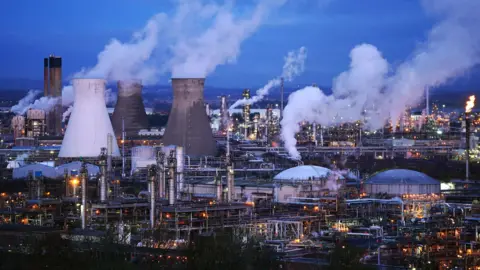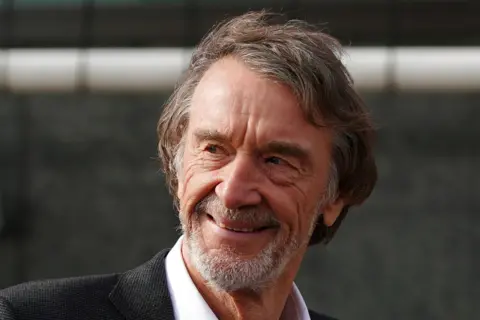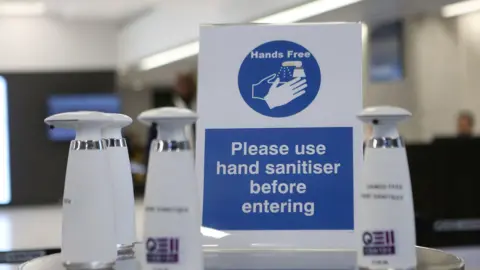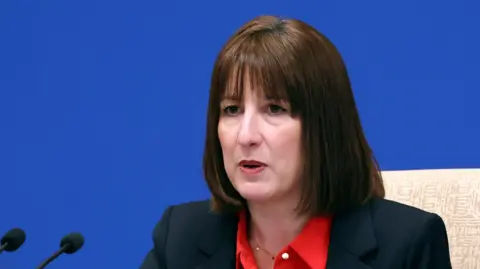Grangemouth closure and 'bruised' business confidence
 PA Media
PA MediaIneos attaches its brand to very fast cyclists and even faster yachts, but it was the humble bottle of hand sanitiser that became its most familiar consumer product during the coronavirus pandemic.
The synthetic ethanol contained in it has been produced for more than 40 years at Grangemouth.
Most of the vast output - 226m litres per year, enough to fill 90 Olympic swimming pools - goes into making pharmaceuticals. But last week production ended at the last such plant in Britain, which was one of only two in Europe.
With 80 fewer jobs, directly-employed staff are being re-deployed. However, in a sector with a lot of contractors, Ineos reckons 500 further jobs will be affected by the closure.
This is in a different part of Grangemouth from the refinery, which is half owned by Ineos and half by Petro-China.
That part of the vast Forth Valley complex is due to close around May, as Ineos installs the port capacity to import refined oil for road and air transport across Scotland and the north of England.
 PA Media
PA MediaSome of this fits with the drive to decarbonise the economy. But while demand remains for oil through several decades of transition, Ineos is warning that the UK is becoming ever more dependent on imports.
Sir Jim Ratcliffe, chairman of Ineos, has gone further in comments issued today, along with news of the closure of Grangemouth's ethanol plant.
He argues that the chemical industry is coming to an end in Britain, due to high energy costs and carbon taxes.
It is claimed these add at least 10% to the price of ethanol when compared to producers in other parts of the world.
"The price of energy for a plant such as this is five times higher than those in the USA," says Ineos. "The UK cannot compete with such a huge disadvantage."
 PA Media
PA MediaThe EU and UK are to the fore in carbon tax, providing a strong incentive to industry to reduce its carbon footprint by either using less oil or gas, or having to buy carbon permits on an open market from others who are using less.
That cost does not apply in other parts of the world, from which refined oil and ethanol will soon be imported.
"Deindustrialising Britain achieves nothing for the environment," says Sir Jim. " It merely shifts production and emissions elsewhere.
"The UK, and particularly the north, needs high quality manufacturing and the associated manufacturing jobs.
"We are witnessing the extinction of one of our major industries as chemical manufacture has the life squeezed out of it."
His call to the UK government is for an energy policy that ensures competitive pricing, and a carbon trading regime that "supports industry and decarbonisation equally".
That policy, and the industrial one that goes with it, is proving elusive. Six months into the Labour administration, the prime minister wants a focus on opportunities from Artificial Intelligence.
Industry is looking for clearer signals before it can invest, still stinging from the tax raid in the 30 October Budget.
 Reuters
ReutersThere is some alarm that bond markets have lowered confidence in the government's economic strategy for growth, tax and inflation. This has resulted in higher borrowing costs for the Treasury and a weaker pound sterling, piling political pressure on the Chancellor, Rachel Reeves.
Industry is not alone in looking with alarm at the prospect of sustained higher interest rates and further bad budget news in the spring.
A regular survey of chief financial officers (CFO), carried out by Deloitte business consultancy, reported that their top priority was not investment or inflation but cost-cutting, to respond to the increased payroll cost of the National Insurance contributions and a higher minimum wage.
Their confidence levels are well up on the pandemic years, and the balance of opinion is that the Bank of England base interest rates will fall during this year from 4.75% to 4%.
Yet hiring intentions are at their lowest point for four years, and more than quarter of the CFOs are more pessimistic than they were in the previous quarterly survey. More than half of them rate cost-cutting as a top priority.
Business confidence 'bruised'
With tensions between government and business, and with borrowing costs continuing to rise while the pound falls, the prime minister's speech on AI is intended to show there is a shorter-term strategy as well as a long-term one.
But as the week starts, the CBI employers organisation is putting pressure on MPs ahead of a vital stage in legislation for labour market reforms. It wants, at least, to slow down reforms being demanded by trade unions, saying they'll cost a lot more to implement.
Its president, Rupert Soames, former chief executive of Aggreko and Serco, says that trying to fill a hole in this year's Westminster budget has created another hole - "in the confidence and trust that business has in government".
He told the BBC's Today programme that confidence is not gone but is "bruised", adding: "We think the National Insurance increase is going to feed through into inflation, and that's not good news.
"We're going to have lower growth - not good news. But also because of things like the Employee Rights Bill coming along, you're going to find people laying people off and less likely to employ people."
Such employer organisations warned Labour ministers that their minimum wage would lead to fewer jobs - warnings that turned out to be wrong.
But after only half a year and with a huge Commons majority, the government is not in as strong a place as it might have expected.
The tension, if not contradiction, between its budget tax choices and its drive for growth brings a reminder that it can't achieve its goals without business, and without business confidence.
